The earliest known human settlements in what is now the Democratic Republic of the Congo have been dated back to the Middle Stone Age, approximately 90,000 years ago. The first real states, such as the Kongo, the Lunda, the Luba and Kuba, appeared south of the equatorial forest on the savannah from the 14th century onwards.
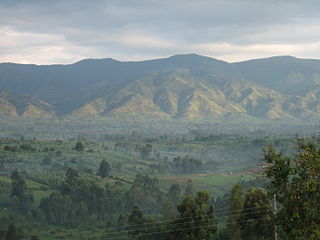
North Kivu is a province bordering Lake Kivu in the eastern Democratic Republic of the Congo. The capital city is Goma. Spanning approximately 59,483 square kilometers with a population estimate of 8,147,400 as of 2020, it is bordered by Ituri Province to the north, Tshopo Province to the northwest, Maniema Province to the southwest, and South Kivu Province to the south, as well as Uganda and Rwanda to the east.

South Kivu is one of 26 provinces of the Democratic Republic of the Congo (DRC). Its capital is Bukavu.

The Second Congo War, also known as Africa's World War or the Great War of Africa, was a major conflict that began on 2 August 1998 in the Democratic Republic of the Congo (DRC), just over a year after the First Congo War. The war initially erupted when Congolese president Laurent-Désiré Kabila turned against his former allies from Rwanda and Uganda, who had helped him seize power. Eventually, the conflict expanded, drawing in nine African nations and approximately 25 armed groups, making it one of the largest wars in African history.

The United Nations Organization Stabilization Mission in the Democratic Republic of the Congo, or MONUSCO, is a United Nations peacekeeping force in the Democratic Republic of the Congo (DRC). A planned withdrawal from the country is currently on indefinite hold due to the unstable security situation.

The term Mai-Mai or Mayi-Mayi refers to any kind of community-based militia group active in the Democratic Republic of the Congo (DRC) that is formed to defend local communities and territory against other armed groups. Most were formed to resist the invasion of Rwandan forces and Rwanda. Groups that fall under the umbrella term "Mai-Mai" include armed forces led by warlords, traditional tribal elders, village heads and politically motivated resistance fighters. Because Mai Mai have only the most tenuous internal cohesion, different Mai-Mai groups allied themselves with a variety of domestic and foreign government and guerrilla groups at different times. The term Mai-Mai refers not to any particular movement, affiliation or political objective but to a broad variety of groups.

Goma is the capital and largest city of the North Kivu Province in the eastern region of the Democratic Republic of the Congo. It is located on the northern shore of Lake Kivu and shares borders with Bukumu Chiefdom to the north, Rwanda to the east and Masisi Territory to the west. The city lies in the Albertine Rift, the western branch of the East African Rift, and is only 13–18 km (8.1–11.2 mi) south of the active volcano Mount Nyiragongo. With an approximate area of 75.72 km2 (29.24 sq mi), the city has an estimated population of nearly 2 million people in 2022, with at least 500,000 displaced people.
The Banyamulenge are a community that lives mainly in South Kivu Province, Democratic Republic of the Congo. The Banyamulenge are not culturally and socially distinct from the Tutsi of South Kivu, with most speaking Kinyamulenge, a mix of Kinyarwanda, Kirundi, Ha, and Swahili.
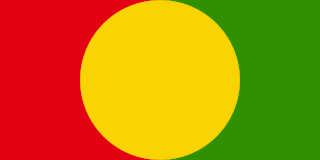
The Democratic Forces for the Liberation of Rwanda is an armed rebel group active in the eastern Democratic Republic of the Congo. As an ethnic Hutu group opposed to the ethnic Tutsi influence, the FDLR is one of the last factions of Rwandan rebels active in the Congo. It was founded through an amalgamation of other groups of Rwandan refugees in September 2000, including the former Army for the Liberation of Rwanda (ALiR), under the leadership of Paul Rwarakabije. It was active during the latter phases of the Second Congo War and the subsequent insurgencies in Kivu.

The Kivu conflict is an umbrella term for a series of protracted armed conflicts in the North Kivu and South Kivu provinces in the eastern Democratic Republic of the Congo which have occurred since the end of the Second Congo War. Including neighboring Ituri province, there are more than 120 different armed groups active in the eastern Democratic Republic of Congo. Currently, some of the most active rebel groups include the Allied Democratic Forces, the Cooperative for the Development of the Congo, the March 23 Movement, and many local Mai Mai militias. In addition to rebel groups and the governmental FARDC troops, a number of national and international organizations have intervened militarily in the conflict, including the United Nations force known as MONUSCO, and an East African Community regional force.
Bosco Ntaganda is a Congolese former rebel leader and convicted war criminal. He was the former military chief of staff of the National Congress for the Defense of the People (CNDP), a rebel that group operated in the North Kivu province of the Democratic Republic of the Congo (DRC) during the first phases of the Kivu conflict. He is also a former member of the Rwandan Patriotic Frint (RPF) and a veteran of the Rwandan Civil War, as well as an alleged former Deputy Chief of the General Staff of the Patriotic Forces for the Liberation of Congo (FPLC), the military wing of the Union of Congolese Patriots.
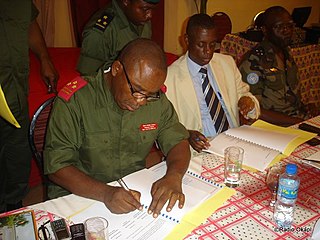
The 2009 Eastern Congo offensive was a joint Congo-Rwanda military offensive against the Hutu Democratic Forces for the Liberation of Rwanda (FDLR) rebel group descended from those groups that carried out the 1994 Rwanda genocide. Two operations were carried out: 'Kimia II' and 'Umoja Wetu.' 'Kimia' can be translated as 'calm.' "Umoja Wetu" is Swahili for "Our Unity".

The M23 rebellion was an armed conflict in North Kivu, Democratic Republic of the Congo (DRC), that occurred between the March 23 Movement and government forces between 4 April 2012 and 7 November 2013. It ended when a peace agreement was made among eleven African nations, and the M23 troops surrendered in Uganda. The rebellion was part of continued fighting in the region after the formal end of the Second Congo War in 2003. The conflict reignited in late 2021 after rebel "general" Sultani Makenga and 100 rebel fighters attacked the border town of Bunagana but failed. A few months later, with a much larger force, the rebels of the M23 movement renewed their attack and captured Bunagana.

The March 23 Movement, often abbreviated as M23 and also known as the Congolese Revolutionary Army, is a Congolese Tutsi-led rebel military group. Based in eastern areas of the Democratic Republic of the Congo (DRC), it operates mainly in the province of North Kivu, which borders both Uganda and Rwanda, and is backed by Rwanda. The M23 rebellion of 2012 to 2013 against the DRC government led to the displacement of large numbers of people. On 20 November 2012, M23 took control of Goma, a provincial capital with a population of a million people, but it was requested to evacuate it by the International Conference on the Great Lakes Region because the DRC government had finally agreed to negotiate. In late 2012, Congolese troops, along with UN troops, retook control of Goma, and M23 announced a ceasefire and said that it wanted to resume peace talks.

The United Nations Force Intervention Brigade (FIB) is a military formation which constitutes part of the United Nations Organization Stabilization Mission in the Democratic Republic of the Congo (MONUSCO). It was authorized by the United Nations Security Council on 28 March 2013 through Resolution 2098. Although it is not the first instance in which the use of force was authorized by the UN, the Force Intervention Brigade is the first UN peacekeeping operation specifically tasked to carry out targeted offensive operations to "neutralize and disarm" groups considered a threat to state authority and civilian security. In this case, the main target was the M23 militia group, as well as other Congolese and foreign rebel groups. While such operations do not require the support of the Armed Forces of the Democratic Republic of the Congo (FARDC), the Force Intervention Brigade often acts in unison with the FARDC to disarm rebel groups.

The Allied Democratic Forces insurgency is an ongoing conflict waged by the Allied Democratic Forces in Uganda and the Democratic Republic of the Congo, against the governments of those two countries and the MONUSCO. The insurgency began in 1996, intensifying in 2013, resulting in hundreds of deaths. The ADF is known to currently control a number of hidden camps which are home to about 2,000 people; in these camps, the ADF operates as a proto-state with "an internal security service, a prison, health clinics, and an orphanage" as well as schools for boys and girls.
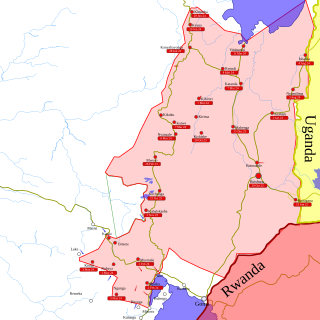
In late March 2022, the March 23 Movement (M23), supported by Rwanda, launched an offensive in North Kivu against the Armed Forces of the Democratic Republic of the Congo (FARDC), and MONUSCO. The fighting displaced hundreds of thousands of civilians and caused renewed tensions between the Democratic Republic of the Congo and Rwanda.
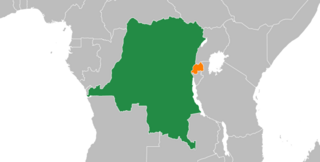
A conflict began between the Democratic Republic of the Congo (DRC) and Rwanda in 2022 after Rwandan forces entered the country to provide military support to the March 23 Movement (M23) rebel group, including fighting alongside them against the Congolese military (FARDC) and pro-government militias.

Modern relations between the Democratic Republic of the Congo (DRC) and Rwanda have origins that date back to the European colonial era. Sharing a border that is 221 km in length, the two countries were both colonial possessions of Belgium between 1919 and 1960, and were impacted by the two world wars. Both Rwanda and the Congo experienced violent upheavals during their first years of independence, with the Congo being left with a weak central authority, and Rwanda dealing with periodic raids and incursions from expelled Tutsi rebels in the east of the Congo.
Events of the year 2024 in the Democratic Republic of the Congo.
















